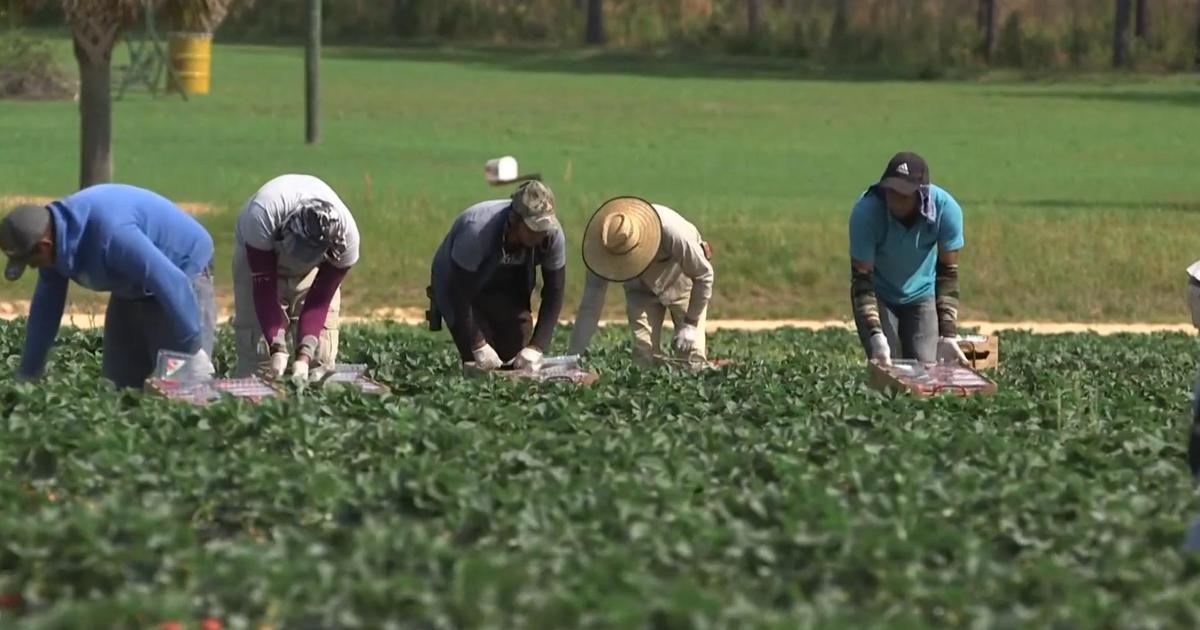Clarksburg, California — On a sunny August morning in the small agricultural town of Clarksburg, U.S. Health and Human Services Secretary Xavier Becerra made an appearance outside the local public library. Before temperatures soared to a scorching 103 degrees, Becerra stood before a group of local reporters and government officials to discuss the Biden administration’s efforts to protect farmworkers from extreme heat and wildfire smoke, two pressing public health issues that have been exacerbated by the ongoing climate crisis.
Becerra, whose father had worked in the fields, expressed his concerns about the lack of adequate protections for farmworkers who are responsible for harvesting the food that ends up on our tables. He shared his recent experience visiting women picking grapes in the intense summer heat of Clarksburg. These women were dressed in sweaters, long pants, and kerchiefs covering their noses and mouths to shield themselves from the sun.
The town of Clarksburg, with a population of about 300 people, plays a significant role in supplying California’s wine industry with grapes such as petite sirah and sauvignon blanc. The long and intense summers in Clarksburg pose a challenge for the hundreds of farmhands working tirelessly in the fields.
“We owe everyone who is working to put food on our table the best effort to make sure that they are working under the safest conditions,” Becerra emphasized during his visit with the farmworkers.
As one of the leading voices on climate change within the Biden administration, Becerra has been focusing on the impact of extreme weather on marginalized workers, who often bear the brunt of these environmental challenges. In March, HHS released voluntary safety guidelines and educational materials aimed at helping farms protect their workers from the dangers of heat and smoke.
While addressing the reporters, Becerra acknowledged the limitations of his jurisdiction in overseeing workplace protections, as that responsibility falls under the Department of Labor. However, he emphasized the importance of ensuring that farmworkers, who play a vital role in our food supply chain, are working in safe and healthy conditions.
The discussion also highlighted the increasing frequency and intensity of extreme heat due to climate change, which has become the leading weather-related killer in the U.S. Additionally, wildfires fueled by climate change have become a significant threat across the nation, further endangering the health and safety of farmworkers.
In July, the U.S. Department of Labor proposed a workplace heat standard that would require employers to provide rest breaks, water, shade, or air conditioning to workers exposed to excessive heat. However, the finalization of the rule is expected to take years, and it remains uncertain whether it will supersede existing state regulations.
California is one of five states that already have heat safety protections for workers, mandating provisions such as water, cool-down areas, and breaks when temperatures reach certain thresholds. Becerra emphasized the importance of a federal heat safety standard that would offer protections nationwide and hold states like Florida and Texas accountable for ensuring minimum safety standards for workers.
Despite California’s stringent heat protection standards, farmworkers like Lizbeth Mastache continue to face challenges such as working in smoky conditions during wildfires and extreme heat. Mastache shared her experiences of suffering from headaches, fatigue, and nausea due to the heat, and even having to seek emergency medical care for asthma triggered by smoky skies.
Farmworkers like Mastache also highlighted the need for guaranteed sick leave and affordable health insurance to address the health impacts of extreme heat and wildfire smoke. Some farms have been resistant to allowing outreach workers to educate their employees about preventing heat illness, posing a significant challenge for seasonal workers who may not be aware of their rights.
Research conducted at the University of California-Merced’s Community and Labor Center revealed that a significant percentage of farmworkers in California do not receive minimum rest breaks or have access to heat illness prevention plans. Fear of retaliation often deters workers from reporting violations by their employers, underscoring the need for stronger protections and enforcement mechanisms.
While the California Farm Bureau disputes some of the findings regarding heat illness among farmworkers, they have taken steps to train farmers and ranchers on protecting workers from heat-related risks. However, advocates for farmworkers stress the importance of ensuring that federal funds allocated for health care providers reach the most vulnerable populations, including farmworkers who are at high risk of heat-related illnesses.
As Becerra concluded his address in Clarksburg, he turned his focus to the next issue of advocating for lower prescription drug prices in Stockton with Democratic Rep. Josh Harder. Becerra’s commitment to addressing critical health and safety issues facing farmworkers serves as a reminder of the ongoing challenges in ensuring the well-being of essential workers in the face of climate change.
This article was produced by KFF Health News, a national newsroom dedicated to in-depth journalism on health issues and operated as one of the core programs at KFF, an independent source for health policy research, polling, and journalism. KFF Health News is also the publisher of California Healthline, an editorially independent service of the California Health Care Foundation.









